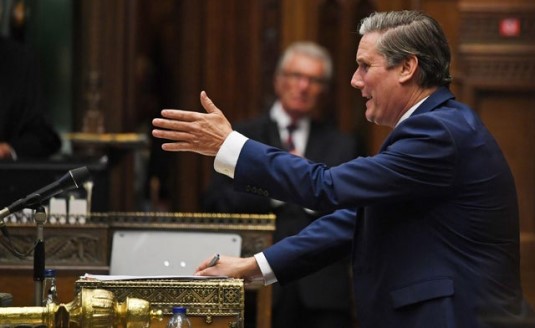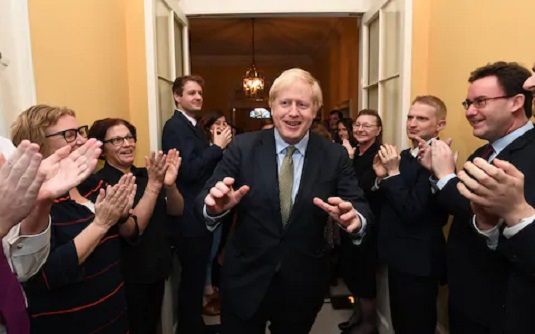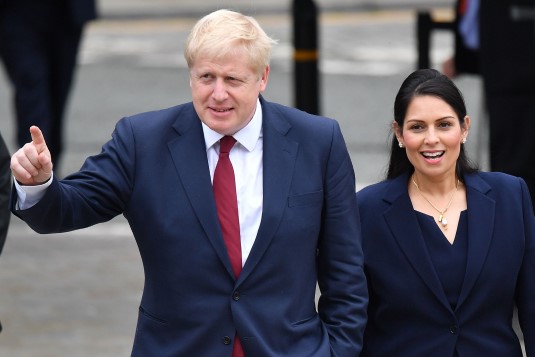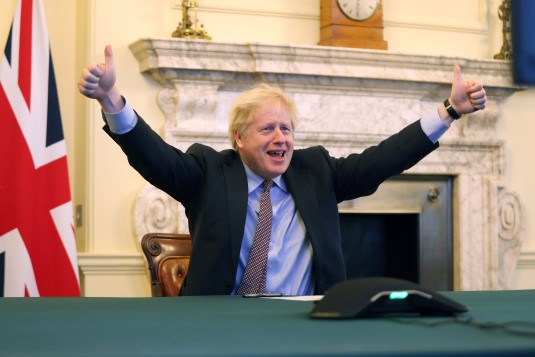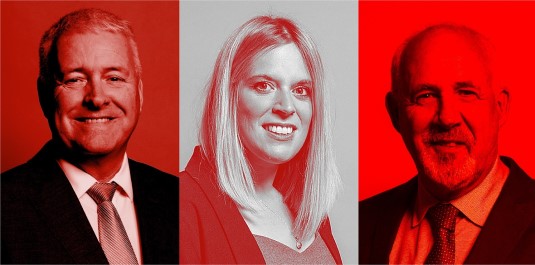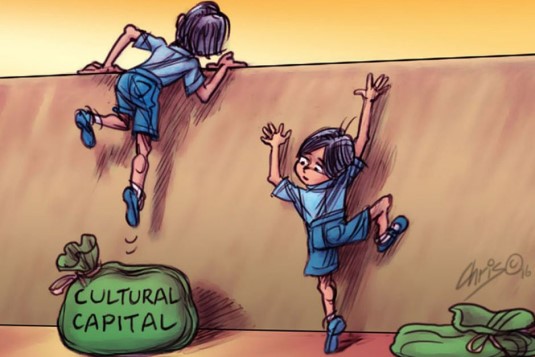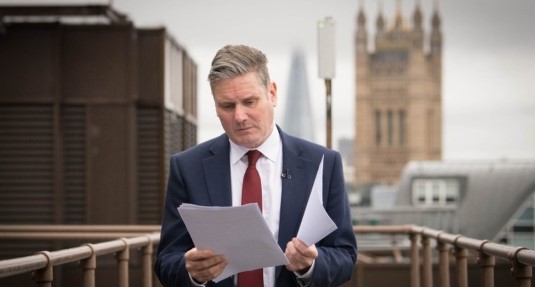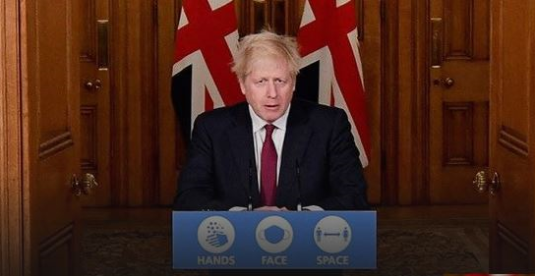Feeling honour bound to defend postmodernism? As if 2020 couldn't get weirder, and yet here we are. In a week where naked men in panda masks ride the New York free way, a signal of possible alien origin from Proxima Centauri is under investigation, and Keir Starmer did some opposition at PMQs, the discourse was enlightened by the sudden trending of one Michel Foucault. The
enfant terrible of the French academy and San Francisco bathhouses, it's only taken him 36 years since his premature demise to become a trending topic. The occasion was a throw away line in a lazy, terrible speech by Liz Truss, signalling how the Tories intend to target "wokeness" as their Brexit substitute seeing its days as their ideological firmer-upper
de jour are numbered. Foucault got namechecked as a trendy denier of truth/champion of relativism. As night follows day - no schizoid lines of flight here - our dear old friend postmodernism crackled around the circuits of social media, dropping confusion bombs and 280 characters' worth of denunciations. Ho, ho, what an incorrigible trickster our neon nihilist nightmare is. One of the intensities it charged up to the point of attracting the flitting moths of the attention economy was
Paul Mason's thread, so why not ride the 90s PoMo vibe a bit further and look at what he has to say.
Paul tells the story (
not a metanarrative) about how his entry into politics in the 70s found him among feminist, anti-racist, and LGBTQ activists motivated by the fight for equality, and who took their theoretical bearings from Marxist and
Marxisant New Left figures. From this they derived their sense of (in)justice. The point being the comrades active at the time didn't need our fashionable French trendies or anything remotely postmodern to get on and do their politics business. Paul writes "Postmodernism was the slave ideology of neoliberalism; a justification for our atomisation; the denial of objectivity and a profound anti-humanism." This is as much a hatchet job as saying Marx was an economic determinist who forecast absolute immiseration or, worse, was a
devout Hegelian with communist verbiage. Postmodernism is much more than a desktop folder kept purposely adjacent to the trash for theory one doesn't like. Indeed, it's debatable whether PoMo is an ism at all - at least where philosophy and the social sciences are concerned.
Taking cues from Jean Francois Lyotard and Fredric Jameson, it's worth thinking about postmodernism as more a
feeling and an
imaginary than an 'ideology'. Lyotard called his book
The Postmodern Condition and Jameson subtitled his
Postmodernism with
or, the Cultural Logic of Late Capitalism. It is also worth noting hardly anyone ever referred to themselves as a postmodern
ist. Foucault said he didn't know what postmodernism was, Deleuze didn't like it, Baurdillard and Derrida hated it. Were the thinkers most closely associated with "the postmodern" being tricksy and playing silly language games in foreswearing all responsibility? No. Their philosophy was not relativistic let alone nihilist. It was about uncovering the complexities of a social world accustomed to peddling stories, narratives and, if you will, ideologies, that smothered and denied this basic fact. If others wanted to write popular guides and introductory texts to postmodernism to hit academic publishing quotas while distorting the positions of poststructuralist thinkers, well, that's hardly the fault of our Kristevas and Guattaris.
Time for a brief look at the postmodern according to Lyotard and Jameson. In the
Postmodern Condition (which, interestingly, Lyotard dubbed his "worst book") he noted society had moved into "postmodernity" characterised by the mass media, computers, and the post-industrial economy (as opposed to the modernity of factories, mass (uniform) production, and the dominance of industrial (physical) labour), the shift from material to the production of symbolic and linguistic goods, and the reconfiguring of culture into a confusion of overlapping and multiplying language games. The irreverence and horizontalism of the new cleaved into the old, incorporating some and memoryholing the rest. This anarchic spirit includes science too. As he famously wrote of science's relationship to the stories and myths culture tells itself,
Science has always been in conflict with narratives. Judged by the yardstick of science, the majority of them prove to be fables. But to the extent that science does not restrict itself to stating useful regularities and seeks truth, it is obliged to legitimate the rules of its own game. It then produces a discourse of legitimation with respect to its own status, a discourse called philosophy. I will use the term modern to designate any science that legitimates itself with reference to a metadiscourse of this kind making an explicit appeal to some grand narrative, such as the dialectics of Spirit, the hermeneutics of meaning, the emancipation of the rational or working subject or the creation of wealth … Simplifying to the extreme, I define postmodern as incredulity toward metanarratives. (1984, p.xxiv)
.
After years of assaults on experts, the untramelled propagation of capitalist realism, and the rise of
rag tag and bobtail conspiracy theories, does nothing affirm the acuity of this statement more than life since the turn of the century? For his part, Jameson makes similar arguments in his
Postmodernism, albeit from a Marxist viewpoint as opposed to a fuzzy hinterland bordering the historical materialist
corpus. Simply put, Jameson's diagnosis rests on a symptomological survey. Postmodernism is a culture marked by the collapse of representation, whereby the complexity of the social becomes too much to be straitjacketed in dominant political forms and previously established cultural tropes. This is also a culture of spectacle and surfaces, of subsumption and complete commodification. In otherwords, the endpoint of the culture industry diagnosed by Adorno and Horkheimer - underlined by the complete collapse and erasure of the high/low culture distinction. History is cancelled and the present is everything, buried by the twin eruptions of ignorance and history fictions, which gesture toward the "truth" of the past or offer
completely simulated histories without a referent. This leads to a culture that is neither stratified nor sorted, but one open to and exercising schizophrenic relationships with itself. Ideas of boundaries are hopelessly obsolete, and the very notion of depth or hidden meanings is naive. And as if underlining the two-dimensionality of the postmodern, much of its movement can only be experienced on the flatness of the screen. For Jameson, this comes with a new emotional register: an emphasis on and privileging of intensity. Any moment is open to flashes of pain, joy, offence, and mourning, sustained by a culture of incessant overstimulation, the public display of feeling, and an injunction to share. This proceeds to the background thrum of machinery and processing power, allowing for new combinations, generation of, and reproducibility of culture, in turn covering and smothering everything with the postmodern sensibility. The postmodern then is glitzy and kitschy, garish and fabulous, unoriginality chasing the new, the eternal return of nostalgia, and an irresistable, unconscious tendency to the unserious and parodic. For Jameson, the postmodern is pastiche.
As a broad brush overview of the culture of the 1970s onwards, it's hard to say this is not the case in the advanced industrial societies. Lyotard and Jameson are not
arguing for relativism, but are simply noting it's a facet of everyday life. Therefore science is not impossible, but is perceived as one discourse among many. This, the whole phenomenon of the postmodern condition, is not the responsibility of
The History of Sexuality or
Anti-Oedipus, or doing the deconstruction do to scientific texts - as the arrogant and ignorant
Intellectual Impostures by Bricmont and Sokal suggests - but the outcome of social development. Which brings us to Paul Mason's second gripe with "postmodernism" - its anti-humanism.
Anti-humanism is
not the same thing as anti-human. It is rather the philosophical position, and the default commonsense in social science in the 21st century, that human beings - sometimes referred to as bodies - are socially and historically constituted. There are no essences endowing people of particular "types" with pre-social characteristics of the spiritual, biological, or psychological kind, and what human beings (or, to be in more tune
with Deleuze,
becomings) think, feel, and do have histories and are always, at all times, conditioned by the complex of social relationships bearing down, structuring, and enabling their agency. This is further muddied by the fact what is "human" is, as per Lyotard's and Jameson's remarks, is mediated by technologies and transformed by them. For those Marxists who find this unconscionable and too close to Althusser's notion of history without a subject, think about Marx's position on commodity fetishism: how relations between people appear as relations between things and, ultimately, how one thing - capital - has a horrifying efficacy of its own, compelling billions to act as if it is alive and driving social development. Humanism, on the other hand, is an ideological and essentialist excretion that clings to materialist theory and needs scraping off - not because close readings of Marx and the operations executed via
For Marx and
Reading Capital are fun times, but because humanism distorts and obscures social analysis. As Andrew Collier pointed out in
Socialist Reasoning, the crimes committed by sundry Stalinist regimes were given ideological cover by their victims not matching up to some idealised proletarian, or the standards expected of socialist citizens. We see it in less tyrannical forms on the left too with the privileging of the ideal worker/activist and how those who fall short of the virtues projected onto them, such as working class Tory voters, are somehow
not working class, or how raising criticisms makes a comrade a renegade. Humanism so understood is the application of a set of values or positions to groups of human beings prior to the work of analysis and, from the standpoint of generating useful social theory that might guide action, is utterly useless for doing so.
All said and done, the postmodern condition is with us and, if they must be referred to as postmodern theorists, the legacy of trendy French thinkers remains. But
this is good. Considered in terms of social theory, was the emphasis on difference and multiplicity such a bad thing? Of course not. Inseparable from the postmodern condition in philosophy and the social sciences was the breakthrough into mainstream debates of voices and experiences hitherto excluded from them: women's voices, postcolonial voices, diasporic voices, LGBTQ voices, disabled/impaired voices. The ground zero for many of these interventions were
feminist debates in the 90s, where this reconciling of difference with a politics of liberation was taken much more seriously than the self-appointed guardians of Marxism, who mainly ignored them. And what has been the result of this engagement? The resurgence of an open-ended feminism. It was reconciled
because of the foregrouding of experiences. Talking up differences brought out the commonality of women's oppression and, particularly, the systematic inequalities enforced by patriarchal power - hence the feminism of the new wave is relaxed about issues of difference because the movement knows what it is against and what it is for. A similar sort of thing is happening now with the politics of class. The predisposition of the rising class of workers to socially liberal values largely innoculates them against the divide-and-rule identity politics of the right, while a conscious awareness of their collective interests are forging bonds of commonality.
Corbynism in this country and new left movements elsewhere, combined with new patterns of
becoming show this process is still at its beginning, but one pregnant with imminent potentialities. Why else are socialist and, whisper it, communist politics coming back if not symptoms of an emergent collective consciousness?
Postmodernism, in as much as it is a thing, or a trend in social theory has cleared the way for a new materialism and hosed away metaphysical schemes bound up with and supportive of prevailing patterns of domination, power, and capitalist realism. It might have been difficult to apprehend this at the time, but from the perspective of 2020 with its stark inequalities, pandemics, and looming climate disaster the first returns of postmodernism are now banked and we can get on with understanding the world in all its complexity. Otherwise, how can we hope to change it?
Image Credit


